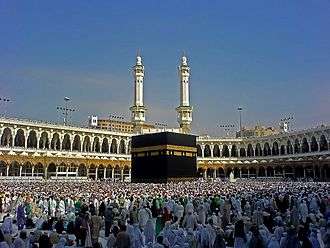Sujud
| Quran |
|---|
 |
|

Sujūd (Arabic: سُجود, [sʊˈdʒuːd]), or sajdah (Arabic: سجدة, pronounced [ˈsædʒdæ(tu)]), is an Arabic word meaning prostration to God (Arabic: الله Allah) in the direction of the Kaaba at Mecca which is usually done during the daily prayers (salat). While in sujud, a Muslim is to praise and glorify Allah. The position involves having the forehead, nose, both hands, knees and all toes touching the ground together.
Overview
Sujud (prostration) is one of the main pillars of daily prayer in Islam. A single act of sujud is called a sajdah (plural sajadāt). Muslims do sujud several times in each prayer, depending on the number of raka'at of prayer: two sajadat are performed every raka'ah, and prayers vary in obligatory length between two and four raka'at (additional supererogatory raka'at are often performed as sunnah muakkadah, or emulation of the example of Muhammad as represented in the sahih hadith). A raka'ah is a unit of set actions that have to be performed in a prayer. The shortest fard (obligatory) Muslim prayer is that of fajr, performed immediately before sunrise. It consists of two raka'ah. The raka'ah can be described as follows:[1]
- Standing and saying Allahu akbar, reciting surah al-Fatiha, and reciting a short passage of the Quran such as sura al-Ikhlas.
- Performing ruku' (bowing down) without bending the knees and with hands resting on the knees, while reciting additional phrases to glorify Allah.
- Standing up from bowing, and reciting further.
- Going in prostration (sajdah) once, while reciting additional specific phrases to glorify Allah.
- Lifting the face up from prostration but sitting on the ground in a special position.
- Performing a second prostration (sajdah).
- Rising for the second, third, or fourth raka'ah. In the last raka'ah, the Muslim remains sitting and recites the tashahhud, and then performs the taslim by turning the head to the right and saying, as-salamu alaikum wa rahmatu Allah wa barakatuh ("may the peace, mercy, and blessings of Allah be upon you"), and then turning the head to the left and repeating the blessing to conclude the prayer.[1]
Points 1-7 define one raka'ah. Thus, the shortest prayer, that of fajr, contains four sajadat. For Hanafis, witr prayer is three raka'ahs, which is for them considered wajib, a level of necessity below that of fard but above all else: in practice, this makes witr obligatory.[1]
While in sujud, the use of a turbah (a small piece of soil or clay, often a clay tablet), on which a person places their forehead, is compulsory in most Shi'a schools of Islam.
Other types of sujud
Sajdah of thankfulness
This is from the sunnah of the Islamic prophet Muhammad that whenever he used to hear news which would make him happy, he would make sujud to thank Allah.
Sajdah of recitation / Tilawah
During the recitation of the Qur'an and during loud recitation prayers there are fifteen places where, when Muhammad recited a certain ayah (verse), he prostrated to God.
The verses are:
- Chapter (Surah) 7 Verse 206,
- Surah 13 Verse 15,
- Surah 16 Verse 49,
- Surah 17 Verse 109,
- Surah 19 Verse 58,
- Surah 22 Verses 18
- Surah 22 Verses 77
- Surah 25 Verse 60,
- Surah 27 Verse 26,
- Surah 32 Verse 15,
- Surah 38 Verse 24,
- Surah 41 Verse 37,
- Surah 53 Verse 62,
- Surah 84 Verse 21,
- Surah 96 Verse 19
In most copies of the Qur'an these are indicated by ۩ with an over-line on the word/s that invoked the prostration. Muslims must prostrate once in order to follow the Sunnah (example) of Muhammad and recite any one or more of the following along with Takbeer before and after the sujud,
- "الهُمَّ لَكَ سَجَدتُّ وَبِكَ آمَنْتُ وَلَكَ أَسْلَمْتُ، سَجَدَ وَجْهِيَ ِلِلَّذِي خَلَقَهُ وَصَوَّرَهُ وَشَقَّ سَمْعَهُ وَبَصَرَهُ بِحَوْلِهِ وَقثوَّتِهِ تَبَارَكَ اللهُ أَحْسَنُ الْخَالِقِيْنَ"
- "سبحان ربي الأعلى"
- "سبوح قدوس رب الملائكة والروح"
- "سجد وجهي للذي خلقه وصوره وشق سمعه وبصره بحوله وقوته تبارك الله أحسن الخالقين"
- "اللهم اكتب لي بها عندك أجرا واجعلها لي عندك ذخرا وضع عني بها وزرا واقبلها مني كما قبلتها من عبدك داود"
Sajdah of forgetfulness
Sujud Sahwi or Sajdah of forgetfulness occurs during the ritual salat prayer. Out of forgetfulness a person can either omit obligatory parts of salat (Qabli) or add to the salat (Ba'adi). In either cases the person corrects his/her salat by doing the Sujud Sahwi.
Rule of direction of the sujud
Sujud is made only to God. In prayer, Muslims face the Kaaba in Mecca, Saudi Arabia, but make their sujud to God, not the Kaaba. The Kaaba is only a united direction that Muslims face as it is the order of God in the Qur'an. If any person claiming to be Muslim makes a sujud to any thing/deity/person other than God, he is considered a disbeliever, unless it is forced upon them.
Sayings during sujud
There are numerous things that a Muslim can say during sujud as is evident from the example of Muhammad. Among them are duas (prayers for God's help), hamd (praising of God), tasbih (glorifying God) and statements of Muhammad which make a person humble. Muslims are not allowed to recite the Qur'an during sujud. During the obligatory sujud during prayer one recites, "سُبْحَانَ رَبِّيَ الْأَعْلَى".
